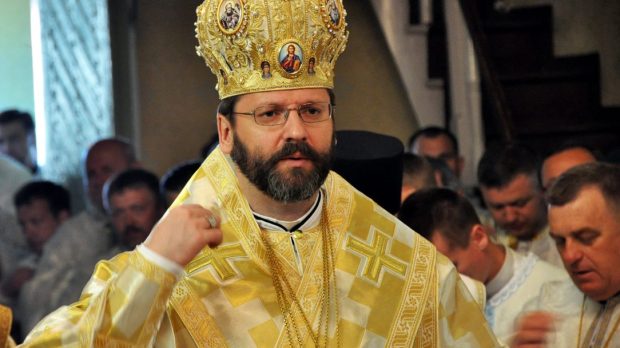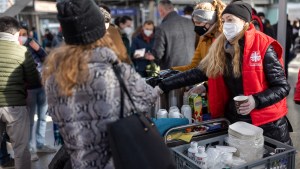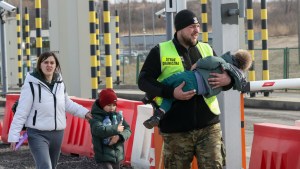As Russian forces continue to attack Ukrainian cities and press toward the capital, the head of the Ukrainian Greek Catholic Church has been making visits to bomb shelters and soup kitchens, an American collaborator of his said Tuesday.
Archbishop Borys Gudziak of the Ukrainian Catholic Archeparchy of Philadelphia said that Major Archbishop Sviatoslav Shevchuk, who has been delivering a daily video message, is now “visiting different bomb shelters or soup kitchens in different cities of the country.”
“The head of our Church this morning called for particular attention to the aged who cannot be moved, who could not escape, who can’t even make it down, maybe, to the bomb shelters or basements of the apartment buildings,” Archbishop Gudziak said at a press conference in Washington, D.C.
Archbishop Gudziak spoke at the National Press Club, joined by Ukraine’s ambassador to the United States, Oksana Markarova. The two addressed the growing humanitarian crisis in Ukraine, as Russia’s invasion approached its three-week mark. Almost 3 million refugees have crossed Ukraine’s borders with Poland, Czechoslovakia, Hungary, Romania and Moldova, while people living in cities such as Mariupol are under siege and on the verge of starvation.
“The bishops and the priests are out there on the front lines,” Archbishop Gudziak said. Lay people are volunteering in refugee centers and preparing food to ship to areas in the East of the country, in spite of difficult logistics.
Pope Francis trying to speak to Putin
Asked whether he has spoken with Pope Francis about the war, Archbishop Gudziak said that he met with the pontiff about five weeks ago, while the US and other Western nations were still warning that Russia’s months-long buildup of troops along Ukraine’s borders could lead to war.
“I asked him to speak to Vladimir Putin,” the archbishop said. According to him, the pope smiled and responded, “That could be done.”
“And I think he’s been doing everything he can, behind the scenes,” the archbishop added. “I am convinced that he’s made every effort to speak to Putin. And I have some information that he has not gotten responses to his gestures toward [Russian Orthodox] Patriarch Kirill. But I think that will change. I’m hoping that the Russian Church leadership will open up and hear the Gospel. ‘Do not kill.’”
Update: On Wednesday, the Moscow Patriarchate announced that the pope and the patriarch had a discussion “via remote communication.”
“A detailed discussion of the situation on Ukrainian soil took place,” the statement said. “Particular attention was paid to the humanitarian aspects of the current crisis and the actions of the Russian Orthodox Church and the Roman Catholic Church to overcome its consequences. The parties stressed the exceptional importance of the ongoing negotiation process, expressing their hope for the soonest achievement of a just peace.”
Kirill has been widely criticized for his statements in support of the Russian invasion of Ukraine.
Gudziak said that on the way to the National Press Club for the press conference, he spoke by phone with a Protestant minister in the besieged city of Mariupol. A young woman that the minister had fostered in the past and now had a child of her own had just been killed in shelling. “That minister doesn’t know the fate of the woman’s son,” Gudziak said.
He said that in addition to the many military and civilian deaths, three priests have been killed.
The archbishop also spoke recently with the Ukrainian Greek Catholic bishop of Kharkiv, which has also been the target of Russian air attacks. That bishop is now hosting a local Orthodox bishop whose windows had been blown out by bombing. The city has seen damage or destruction to over 600 buildings, and there is no electricity.
But Kharkiv is not encircled by hostile forces, and the Church is managing to get aid in.
The situation is very different in Mariupol, where aid convoys are not able to enter the besieged city. On Tuesday, however, approximately 20,000 people were able to get out, with the establishment of a humanitarian corridor, the New York Times reported.
“The Church has been strangled”
Gudziak warned of dire implications should Russia succeed in its project.
“In the last 250 years, any time Russia has taken over any part of Ukrainian territory, the Ukrainian Catholic Church has been strangled,” he said. “It happened a couple of times in the 19th century, it happened in the 20th century, and it’s been happening now in Crimea and the Donbas.” Those areas have been part of Russian aggression since 2014.
But it’s not just Christians who have been affected. He said that in Crimea, the historical home of Ukrainian Tatars, that Islamic community has again been persecuted under the Russian occupation.
For her part, Ambassador Markarova called the war a “full-scale genocide,” saying Russia is targeting residential areas of Kyiv and continuing to shell some of its suburbs.
“We now have evidence that the Russians are actually not targeting our armed forces. They are targeting civilians,” she said. “They are killing children, pregnant women, elderly. … They are trying to use terror to scare us into submission and force us to surrender.”
In addition, Markarova said Russia has been targeting cultural and religious sites and has bombed several universities.
She said that in addition to an “immediate increase in military support,” Ukraine needs “all the humanitarian assistance we can get” and “all the diplomatic power the world can put together in order to force Russia to allow the humanitarian corridors, which they deny us for the past 20 days.”
Archbishop Gudziak said that among other things, there is a great need for armored ambulances, different kinds of medicines, blood-clotting bandages, insulin and “all kinds of things that hospitals need to replace with each patient.”
In spite of the bleak humanitarian outlook, the archbishop spoke of a distinct lack of panic. When he speaks to people in Ukraine, including officials and students at the Ukrainian Catholic University, where he was rector for many years, “we’re inspired. There’s a deep conviction; there’s a deep peace” in their voice.”
He said that the bishops and priests ministering to the faithful in the midst of war are at peace. “They’re not afraid of death,” he said. “There’s a belief in eternal life. That’s a witness that is deeply touching the world today.”



